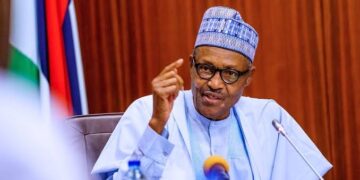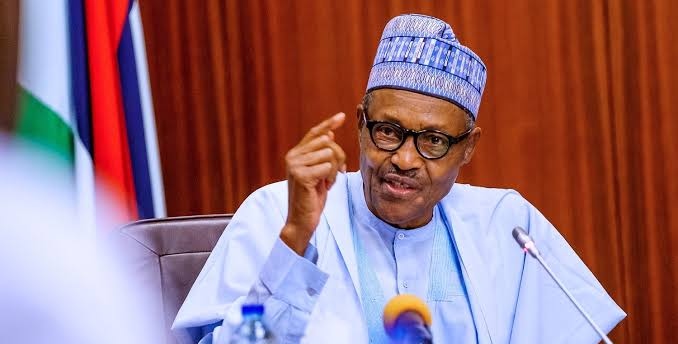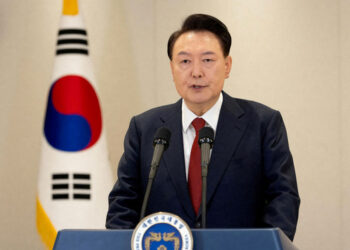By John Ikani
President of Nigeria, Muhammadu Buhari had an exclusive interview with local cable television Channels TV on Wednesday.
The President in the interview monitored by Heritage Times, addressed a number of pressing issues confronting the West African nation.
We bring you highlights of the interview.
1. On banditry and terrorism
President Buhari vowed to flush out criminals ravaging the country’s North-West region, noting that security operatives have been ordered to “go after them.”
According to him: the only language they understand – we have discussed it thoroughly with the law enforcement agencies; the security chiefs, the Inspector General of Police – is to go after them; the terrorists.
“We labelled them terrorists, are we are going to deal with them as such,” President Buhari said during the interview, lamenting why people who share similar culture would go against each other.
He went on to note that there have been successes in the fight against banditry in the region.
“I believe if you go to those constituencies in the North-West and North-Central in the last four weeks, there are improvements in the security,” Buhari added.
Heritage Times can report that populations in northwest Nigeria are facing the ever increasing threat of banditry, a type of organized crime that includes kidnapping, armed robbery, murder, rape, cattle-rustling, and the exploitation of environmental resources.
Armed banditry has become a central security challenge to Nigeria’s northwest that has terrorized communities, killed and displaced thousands, hindered socio-economic development, and threatened democratic governance.
2. On poverty and food insecurity
The President said he is absolutely aware of the suffering and pains Nigerians go through to feed under his administration.
When asked if he was aware of the numbers of Nigerians who find it difficult to feed under his watch, the president answered affirmatively, “I’m absolutely aware of it, but like I said, look at the vast population of Nigerians, only 2.5% of the land revenue are being cultivated. We realised this rather too late, but we have to go back to the land (agriculture).”
The President, however, advised Nigerians to leverage the opportunity that agriculture offers in order to find a lasting solution to the current economic quagmire.
Heritage Times can report that at least 9.2 million people in Nigeria faced a crisis or worse levels of food insecurity between March and May in 2021 amid armed conflicts, COVID-19’s effects and climate change.
3. On signing Amended Electoral Bill
The President assured that he is ready to sign the Electoral Act Amendment Bill if the National Assembly makes the necessary adjustments.
According to him, the necessary adjustments must include consensus candidates, indirect primary options to the mode of selecting a candidate for an election, as against the initial direct mode as the only option to conduct primaries by political parties.
“All I said (is that) there should be options,” Buhari said.
“We must not insist that it has to be direct; it should be consensus and indirect.”
Asked if he would sign if the lawmakers effect the change in that direction, he affirmed, “Yes, I will! I will sign.
“There should be options, you can’t dictate to people and say you are doing democracy. Give them other options so they can make a choice.”
It would be recalled that Buhari had last December, officially rejected the bill which was recently passed by the National Assembly.
His decision to withhold his assent to the bill – which provides for electronic transmission of results from polling units to collation centres – followed the inclusion of direct primary elections in the bill.
According to a letter the President sent to the Senate President, Ahmed Lawan, he cited insecurity and the high cost of conducting the direct primary as his reasons for rejecting the bill.
4. On state of power in Nigeria
The President said he wasn’t happy with the state of electricity in Nigeria.
Heritage Times can report that although Nigeria has the capacity to produce 13,000 megawatts of electricity, it only produces just 4,000 megawatts on the national grid.
The President had in May 2018 queried the spending of $16bn on power projects during the administration of former President Olusegun Obasanjo.
Explaining reasons behind low and unstable power generation in Nigeria, the President said the Transmission Company of Nigeria (TCN) is 100% government-owned, adding that his government inherited the Distribution Companies (DisCos).
According to the President, the owners of Discos bought them based on geo-political zones rather than merit.
He added, “The people that own them, who are they? They are not electrical engineers, they don’t have money, it is just a political favour.
“To remove a system and reintroduce one is no joke. Luckily we have the TCN and that is the transmission. If we can get our technology right, we will cut the cost on transmission and the likelihood of sabotaging the lines and so on.”
5. On widespread youth unemployment
The President urged Nigerian youths to use their education and exposure to improve themselves and not see them as tickets to depend on the government.
“I wish when they go to school; when they work hard; when they earn their degree, they don’t do it thinking that government must give them jobs,” he noted.
“You get educated because an educated person is certainly better than an uneducated person even in identifying personal problems. So, education is not meant just meant to hang on to government to give you jobs and then what the colonialists indoctrinated in us to believe – have a car, have a house; start work by 8:00 am and close by 2 pm.”
6. On possible pardon of secessionist champion Nnamdi Kanu
President Buhari vowed never to release the leader of the Indigenous People of Biafra (IPOB) Mazi Nnamdi Kanu.
Kanu is standing trail of treasonable charges preferred against him by the Federal Government.
Recall that some Igbo leaders had met with Mr President to request for the unconditional release of Kanu.
When asked if he would release Kanu, Mr President said: “We cannot release Nnamdi Kanu. There is no political solution to it. His case is for the judiciary. One of the things I promised myself is never to interfere with the jobs of the judiciary. I have given him the opportunity to defend himself.
“Kanu has been insulting us. He has been given incorrect figures and comments against us. He needs to account for what he did.”
But when asked about the possibility for political solution to the IPOB leader’s case, the president replied affirmatively.
“There is a possibility of political solution. If people behave themselves, all well and good but you can’t go to a foreign country and keep on sending incorrect economic and security problems against our country and thinking that you would not account for what you have been doing. Let him account for what he has been doing,” Buhari said.
7. On widespread calls for state police
President Buhari dismissed calls for establishment of state policing, stressing that it is not an option his administration will tap to solve the security challenges in Nigeria.
According to him, traditional rulers could play the roles of local police because “they know who is who” in their community.
He said: “The role of traditional rulers must not be undermined, because in their areas they know who is who, even by families, not to even talk of individuals.”
Buhari added that more attention should be paid to the relationship between local government and state governors.
8. On his favourite Presidential Candidate
Buhari said the person he wants to succeed him in 2023 might be killed if he names him this time.
Asked if he has a favourite among those eyeing the Presidency in 2023, Buhari said he would rather keep the name of the person to himself, saying he may be eliminated before 2023.
According to him: “I wouldn‘t (mention the name of my favourite successor) because he may be eliminated if I do. I better keep that a secret.”
Though the majority of those interested in Buhari’s job are yet to declare their ambition, some of those being rumoured include, Vice President Yemi Osinbajo, Chief Bola Tinubu, Senator Ibikunle Amosun and a host of others.
9. On resolving herders/farmers clashes
President Buhari restated his administration’s commitment to bringing back cattle grazing routes as a way of resolving clashes between herders and farmers.
He said he has had personal discussions with the Agriculture Minister to bring back the cattle grazing routes in place during the First Republic, mainly in Northern Nigeria.
Since coming to office in 2015, Mr Buhari has maintained the view that the restoration of grazing routes is the only way to solve the problem. He repeated the argument in his latest interview.
“The ministers of agriculture from Audu Ogbe to Mahmud now, one of the issues I discussed with them is to go and get the gazettes of the past republic,” Mr Buhari said.
“There are cattle routes and grazing grounds and cattle rearers are confined to those areas.Those that go outside those areas are arrested and farmers are asked to come make their claims. If they don’t have the money their cattle are sold and farmers are settled.
“So we have to go back to that again and make sure that we prepare those grazing areas and put the veterinary in place. We are working towards achieving that,” he added.
Many Nigerians have criticised that policy, saying herders should instead be made to raise their cattle in ranches.
Hundreds of people are killed yearly across Nigeria in violence between herders and farming communities.
10. On unrestrained sourcing of loans from China
President Buhari defended his government’s decision to source loans from China, saying anyone willing to help Nigeria’s infrastructure is welcome.
According to data from the Debt Management Office, Nigeria has borrowed $2.02 billion as loans from China from 2015 and the country’s debt portfolio from China has risen to $3.40bn as of March 31, 2021.
The Commander-in-Chief equally erased fears in some quarters that Africa’s most populous nation might be plunged into a debt trap.
“We take that (loans) where it is necessary. I told you now of something, what it is used to be between Lagos and Ibadan alone not to talk of the rest of the country,” he said.
“But we got the Chinese to help us in the rail and the roads, how can we turn that down? If we had turned that down, maybe between Lagos to Ibadan, you will have to walk.
“So the Chinese are welcome, anybody that is prepared to come and help us and our infrastructure to do the roads, the rail and power will be welcomed.”




































